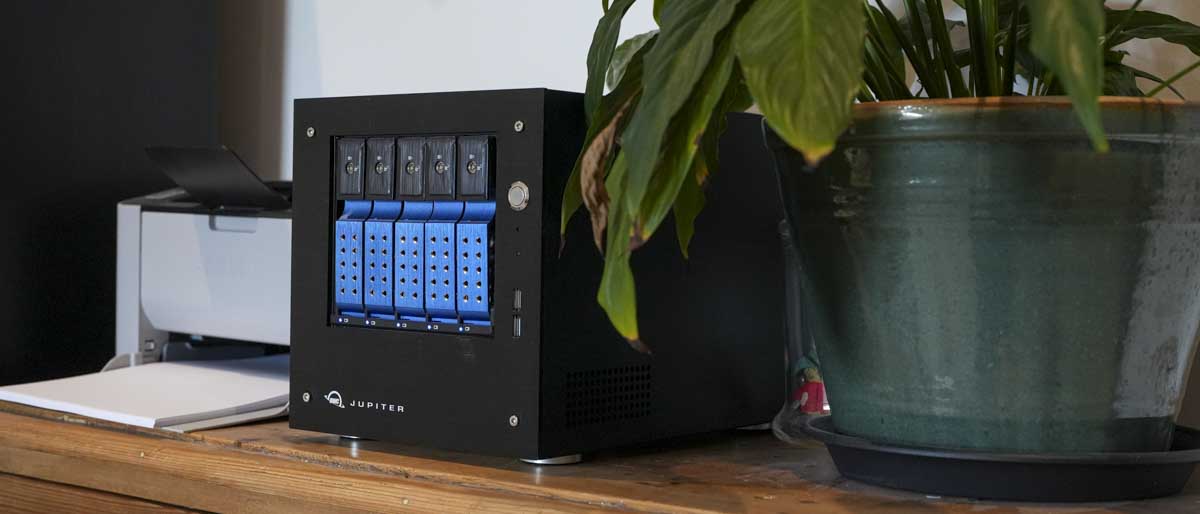TechRadar Verdict
If you are considering NAS solutions, there are plenty of choices. However, OWC has crafted a solution that is both easy to use and administer, sitting between high-end enterprise and consumer models. The five-bay NAS facilitates fast setup and configuration, utilising TrueNAS to maintain, grant access, and adjust settings in a way that non-IT professionals can understand. While administration and use are easy, it has the power and storage to serve up to 50 users logging in to access files, making it incredibly cheap for the power, features and storage it can offer.
Pros
- +
Ultra-fast NAS solution
- +
Self-administered with pro-level features
- +
Out-of-the-box functionality
Cons
- -
Not designed for network video editing
Why you can trust TechRadar
OWC Jupiter Mini: 30-second review
CPU: 2.2 GHz Intel Xeon D-1518 4-Core
Graphics: VGA
RAM: 32GB ECC RAM.
Storage: 5 x 4TB 3.5" 7200 rpm SATA HDDs
Rear Ports: Includes 2x 10GbE and 2x 1GbE network connections, USB-A 3.2 Gen 1.
Front Ports: 2 x USB-A 2.0
Connectivity: 2x 10GbE and 2x 1GbE network connections
Audio: n/a
Camera: n/a
Size: 325 x 220 x 230mm
OS installed: TrueNAS SCALE.
Accessories: n/a
In the background of most offices and studios, there's usually some form of server with access to mass storage working away. This storage is typically found in a secluded area and accessed only by a qualified IT professional. While such network systems are complex and can be tricky to administer, their functionality is essential for any business, essentially supplying a centralised resource where all staff can access shared files of all types.
The OWC Jupiter Mini is a Network Attached Storage (NAS) system that, while not a fully integrated server, performs all the storage jobs that larger enterprise technology handles in large institutions. The Jupiter Mini, though smaller and easier to administer, still offers the potential for a substantial amount of storage, up to 100TB and can be accessed by multiple users without the system slowing down, making it an ideal solution for small to medium-sized businesses and professionals working with TB of photos or video files and needing a professional storage solution.
The Jupiter Mini integrates with your network and can be subdivided into network drives (datasets) that can then be accessed by anyone on that network or remotely, given the correct permissions.
While there are many alternative NAS systems on the market, which may seem considerably cheaper, the Jupiter Mini offers incredible value, considering the performance, storage, and support provided. Unlike many consumer units designed for occasional access, this NAS can connect to the network with a 10GbE connection and is supported by powerful internal hardware capable of handling substantial data flow and multiple concurrent connections without faltering.
We've tried out plenty of the best NAS devices, and in our tests, the speeds over the wired connection were impressive. 140 GB was transferred to three machines in around 30 minutes, which is significantly faster than a consumer unit used to compare.
The speed of the connection makes a considerable difference when storing files, allowing multiple users easy access over the network in a small studio setting using smb shares. This means project folders and files can be quickly downloaded to a working drive and restored once finished. Additionally, equipment forms, risk assessments, and other regularly accessed files are easily reachable on-site, which is invaluable when internet connectivity is unreliable.
Ultimately, if you're a small to medium-sized business and need an easy mass storage device that is fast and easy to access with great support, then there is little to fault with the OWC Jupiter Mini.
Sign up to the TechRadar Pro newsletter to get all the top news, opinion, features and guidance your business needs to succeed!
OWC Jupiter Mini: Price & availability
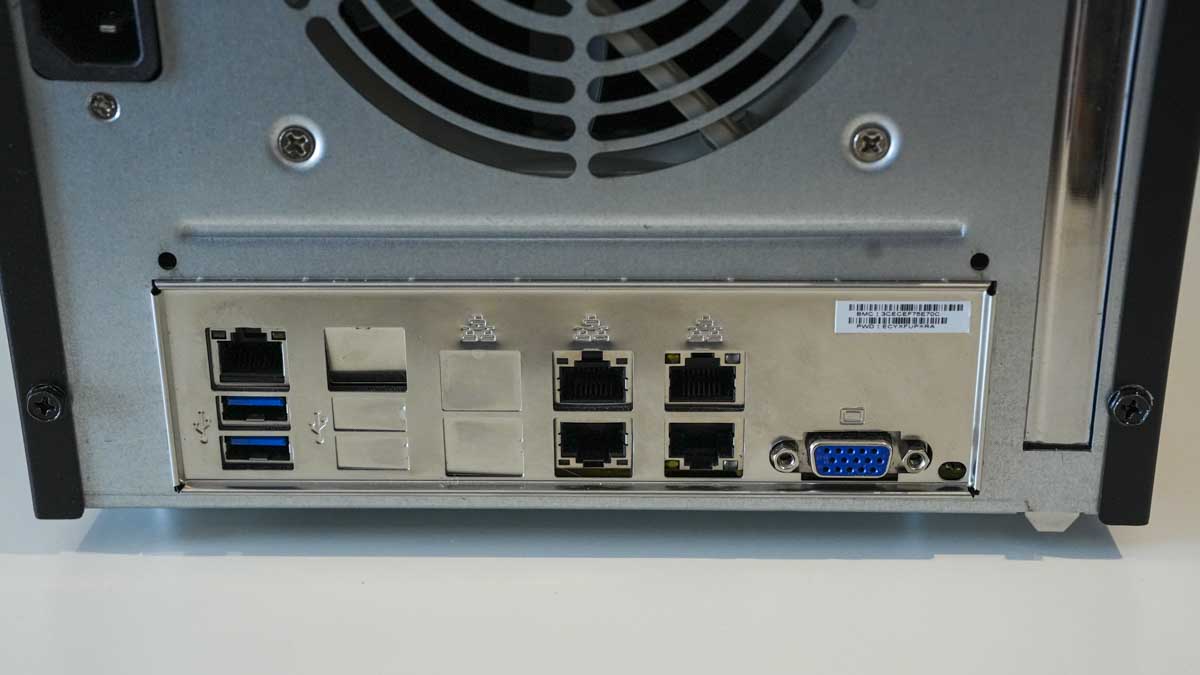
The OWC Jupiter Mini is available directly from OWC and from many technology outlets. However, buying directly ensures that you get the exact specifications and build you require, whether for personal use or your business. Units start at the base level of 20TB, which we've examined in this review, and begin at $2,999.
- Score: 4/5
OWC Jupiter Mini: Design & build
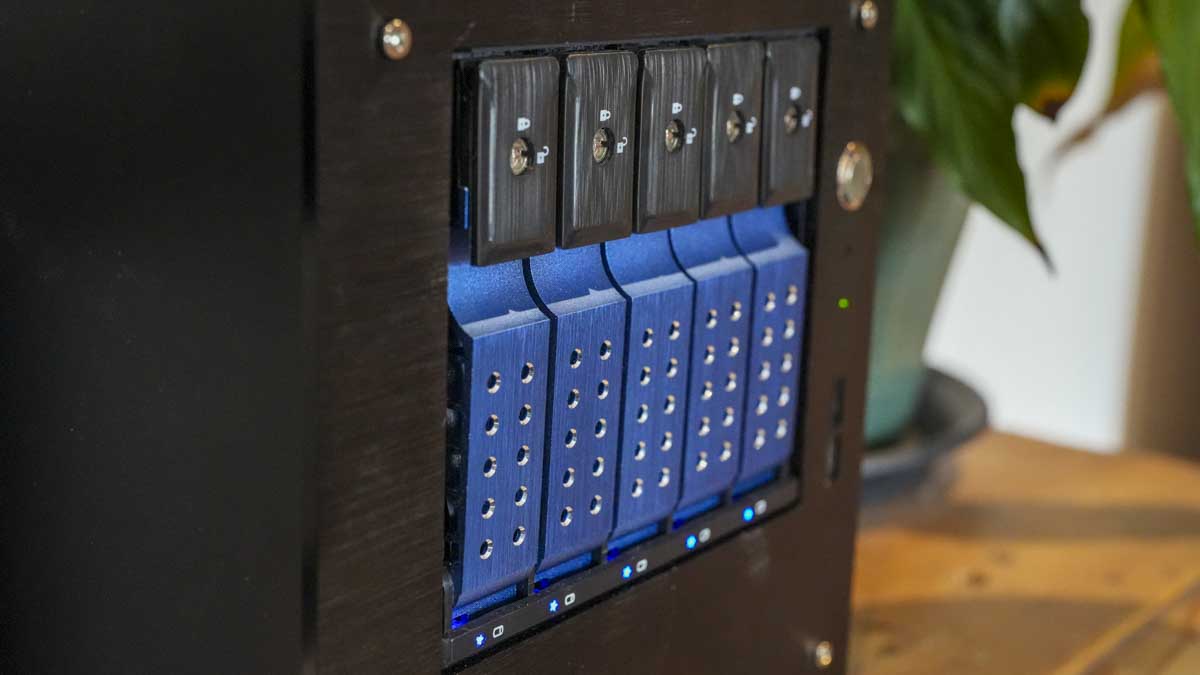
NAS boxes typically have a functional style with quick-access drive slot doors on the front and various ports around the back, often resembling an enlarged external hard drive. OWC, however, has enhanced this design principle with the Jupiter Mini, adding aesthetic touches such as blue anodised door lever locks on the front, giving the drive a stylish edge over competitors.
Despite its aesthetic appeal, this unit's true value lies in its features and functionality. The drive is available pre-configured from OWC and many other retailers, saving at least a couple of hours of setup time. This means it can be quickly integrated into your network and ready for use, providing instant, high-capacity storage without much fuss.
For many small businesses, this easy access to large storage capacity will be more than enough, having a drive that you can simply plug in and then browse the network located the drive login, and the Jupiter Mini network drive just appears on your desktop, ready to use, all very simple. However, the Jupiter Mini is far more, and the appeal of the machine isn't just the simplicity of connection but the ease of use when it comes to the administration of that storage for the people accessing the drive. Administration is handled by the TrueNAS interface, which is pre-installed and enables an administrator to log in and allocate different storage areas to groups or individuals in the form of datasets, as well as enable external sharing and check drive health.
The drive also offers future expansion options, so you can start with the 20TB version and then expand the storage as needed. Drive replacement is made possible in a couple of ways, either by replacing the drives physically in the mini and then creating a new pool/dataset/share with the new drives. Or replace one drive in the pool with the larger one, let it resolve, replace another, let it resilver, and continue until you have replaced all 5 drives. Once this is done, you can then expand the pool to take up additional space on the drives, which is done with a single button press in TrueNAS.
If you like to explore the system, you can connect to the Jupiter Mini directly. It has a VGA port at the back and can be connected to a keyboard and mouse. This approach is far more akin to enterprise-level solutions, and for most users, the GUI of the TrueNAS browser version will be a far easier environment to navigate.
- Score: 4/5
OWC Jupiter Mini: Features
The hardware of the Jupiter Mini is designed to meet the needs of creatives and support the large file types that tend to be handled in these environments, which is where similar capacity but lesser-powered NAS boxes struggle. The Jupiter Mini base capacity is 20TB (expandable to 100TB) and uses ZFS RAID for data protection; this leaves 16TB of usable space. The box comes pre-configured as RAIDZ1 (similar to RAID 5). One of the advantages of this is that the ZFS automatically caches your most frequently used and recent files in RAM, providing faster access to files at flash-like speeds. It also features a high-speed 10GbE network connection, providing faster file access compared to standard NAS drives, with all the processing down to its enterprise-grade Xeon Processor and 32GB of ECC RAM. Using the Jupiter Mini as part of a studio or office setup allows multiple users to access the NAS simultaneously, with automatic file caching for swift retrieval of frequently accessed files.
The system comes preloaded with the TrueNAS SCALE, which enables the easy management of the drive and its storage. This allows different network drives to be created and access permissions granted, ensuring a straightforward setup and management and a system that is fully compatible with both Mac and PC systems.
While the drive's overall handling is quite straightforward, if you do get stuck, there's plenty of documentation online, as well as a comprehensive single-source warranty and outstanding Pro Support from OWC. This support offers assistance during the setup and beyond, ensuring that help is just an email away if you have any questions or issues that may arise.
- Features: 4.5
OWC Jupiter Mini: Performance
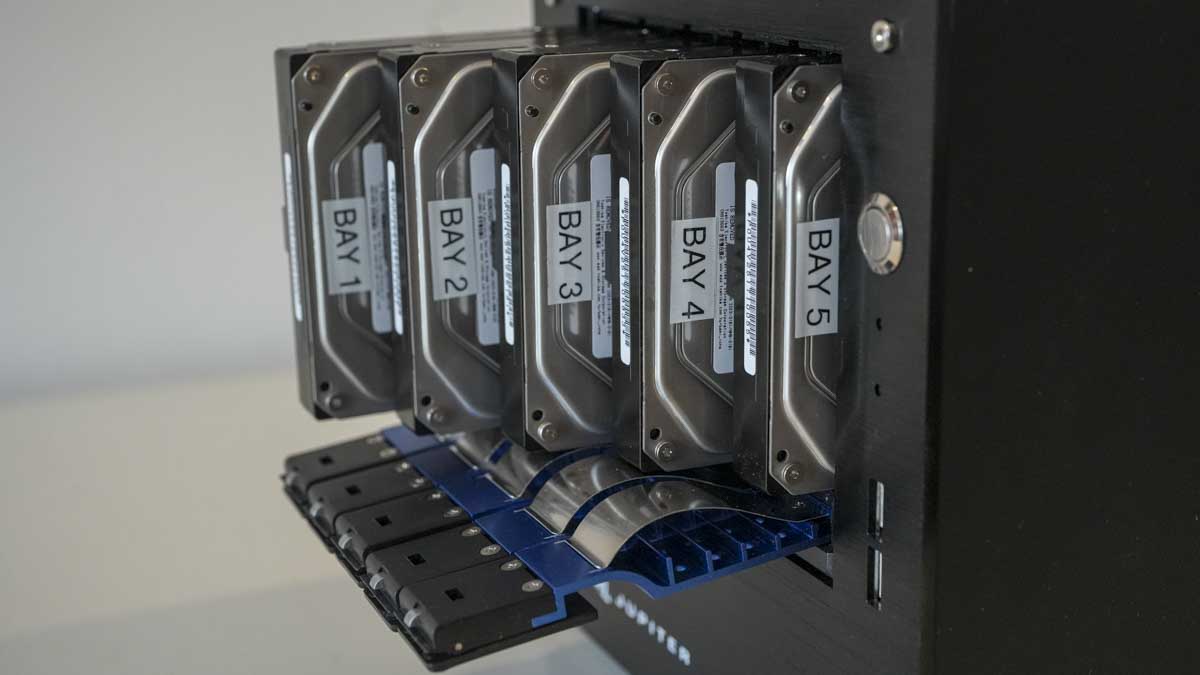
Network storage is a significant asset in any studio or office environment. It enables the sharing of large-format files among colleagues. In a studio setting, this is particularly beneficial for transferring large video files across the network, eliminating the need to copy everything onto portable hard drives and move them from one person to another.
While there are plenty of NAS solutions available, the Jupiter Mini stands out as one of the few options tailored for small to medium-sized businesses, boasting ease of use and operation, power, and scalability without requiring extensive IT experience.
The initial setup and use of the Jupiter Mini were notably straightforward, with the device connecting to the back of the EERO 6 wifi router and becoming accessible throughout the studio and home. This centralised resource proved its value by allowing quick access to essential video and image files for projects. The speed of file transfers was instantly impressive over the wifi connection, with 140GB of data downloading in about an hour and a half, compared to six hours with our existing NAS.
However, when connected to the studio's wired network, the download time for the same files dropped to less than 30 minutes as the files were transferred to the OWC ThunderBlade X8. The OWC ThunderBlade X8 was used as a local working drive and enabled the fast transfer speeds required by the best video editing software for cutting and grading.
In the test, the network here is not the fastest 10GbE network at 2.5GbE. However, the speed was impressive for a self-managed system. After a week, the potential of faster network storage became obvious, and TrueNAS was used to create additional datasets for different groups and users. This enabled different areas of the storage to be assigned as a network drive, with permissions to users and groups assigned. Once the dataset is created, it can then be shared through smb. Another nice feature is that you create a zvol, which then enables you to format that segment of the drive in another file format. There is also a host of apps that can be downloaded and used if you need an on-site web development environment, and again, you can assign part of the storage to this.
Through the test all administration was managed through the browser TrueNAS GUI. While there was a learning curve, it proved to be a powerful tool with plenty of documentation to support its use. As previously mentioned, if you do want a little more, then you can access the command-line version of TrueNAS by using a VGA monitor, keyboard, and mouse, a setup more common in server environments than in small offices.
One key consideration was whether the OWC Jupiter Mini could serve as shared network editing storage for software like Final Cut Pro, DaVinci Resolve, or Premiere Pro. While technically possible with the correct setup and network speed, this NAS is not specifically designed for such intensive tasks, a role better suited to more powerful and expensive solutions like the OWC Jellyfish. However, lighter tasks, such as a centralised resource for photo or graphic design, are well within the Jupiter Mini's remit.
The OWC Jupiter Mini offers an easy-to-maintain, out-of-the-box NAS solution that provides enterprise-level performance, far surpassing what is achievable with consumer models and is scalable up to 100TB to meet the growing data storage needs of home, office, or studio environments.
- Performance: 5/5
Should you buy the OWC Jupiter Mini?
The OWC Jupiter Mini is designed for creative professionals and small businesses that require a commercial network storage solution with substantial storage potential without the need for extensive IT know-how. Commercial NAS boxes, although ideal in functionality, often become completely impractical due to their design, cost, and often complex command-line administration. Conversely, smaller consumer models may offer ease of use but rarely offer the speed or power for multiple concurrent connections, capacity, connection features or ready support. These are all areas where OWC and the Jupiter Mini excel.
As a basic NAS, the Jupiter Mini is straightforward and efficient, making it particularly attractive to videographers and photographers needing reliable storage for projects and files. Its compatibility with the ThunderBlade X8 as a local working drive enhances its functionality. In a home environment, investing time in TrueNAS allows for segmenting the storage and providing dedicated areas for network or shared storage needs within the office or household.
The real advantage lies in its appeal to those seeking commercial-grade network storage that is both high-performing, expandable and reliable. The system includes a built-in support email system to alert users of potential issues with the hardware, preventing drive failures or other significant problems. In an office or studio setting, this single unit can be configured to provide various storage spaces for different groups, with tailored allocations and access, mirroring the capabilities of a large company's IT system.
Although the initial investment in the OWC Jupiter Mini is significant, the value it offers in storage capacity and the ability to self-manage—backed by OWC's excellent support—makes it a great choice. For studios or small offices in need of a network storage solution, the OWC Jupiter Mini stands out as one of the fastest, easiest-to-use, and most versatile systems available.
| Row 0 - Cell 0 | Row 0 - Cell 1 | Row 0 - Cell 2 |
Value | Efficient and cost-effective for its capabilities | 4 |
Design | Sleek, modern design with practical features | 4 |
Features | Extensive features, ideal for varied storage needs | 5 |
Performance | Fast, reliable, and handles large files easily | 5 |
Total | High-performing, feature-rich NAS for professionals | 4.5 |
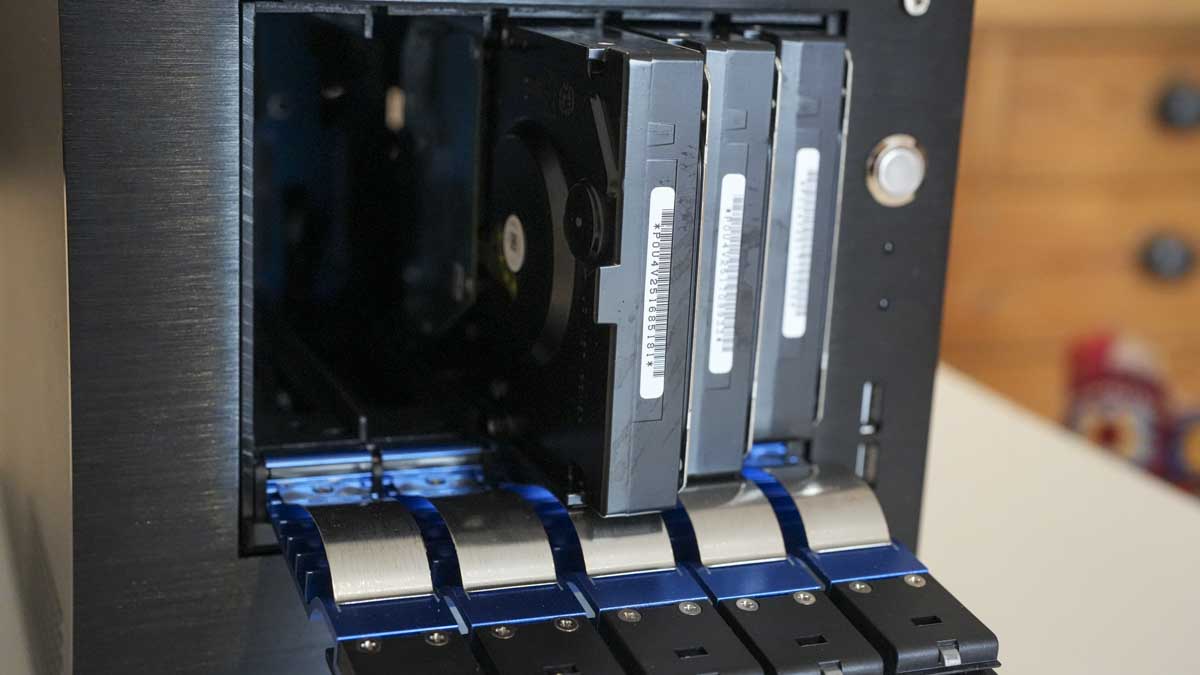
Buy it if...
You want professional network storage
For professionals requiring robust, scalable network storage with easy management, the OWC Jupiter Mini offers high speed, vast capacity, and user-friendly operation.
You want to enhance creative workflows
Ideal for videographers, photographers, and creatives needing fast, reliable storage and file sharing across networks, enhancing productivity and project management.
Don't buy it if...
You're on a budget
If you have minimal storage needs and are on a tight budget, the initial investment in the OWC Jupiter Mini may need to be more cost-effective.
You're a casual home user
It is optional for users with basic file storage needs or who require only simple, low-capacity solutions; it is overkill for casual, non-professional use.
We tested the best business computers - and these are the ones we recommend.
Alastair is a photographer, filmmaker and tech writer who has been working in the publishing industry since the late 1990s. For more than 25 years he has covered photography, video and technology across Future's photography, technology and gaming brands. He runs a photography and video production company and lectures in TV and film. He can usually be found testing mini PCs or prototyping and prop building with the aid of 3D printing.
